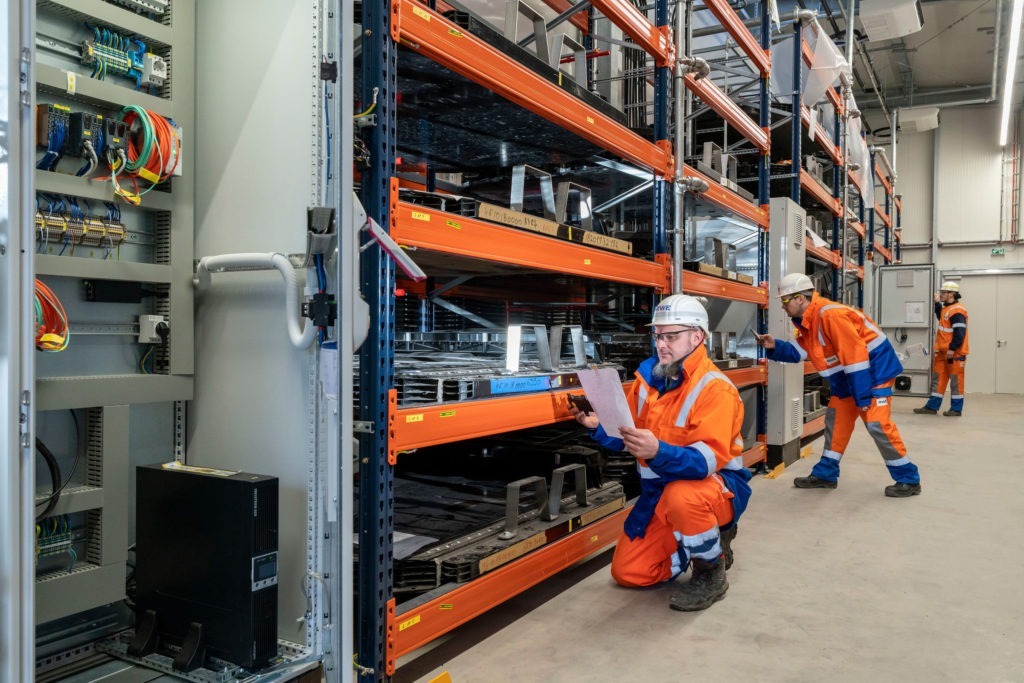As the automotive industry strives to go green, electromobility has become synonymous with sustainability. The aim is for environmentally-friendly factories to build electrified models that will eventually run on renewable energy. But what happens when an electrically-chargeable vehicle (EV) comes to the end of its lifecycle? Companies are considering how an EV’s battery can be re-used, recycled and repurposed.
In Germany, RWE brought a new energy-storage facility online which uses lithium-ion batteries from electric Audi models. The pumped-storage power plant on Lake Hengstey in Herdecke employs 60 battery systems and will be able to temporarily store roughly 4.5MWh of electricity. Meanwhile, in the UK, Veolia announced its first battery-recycling facility. The resource-management company predicts it will have the capacity to process 20% of the country’s end-of-life EV batteries by 2024.
Carry-over capacity
Decommissioned batteries from Audi’s e-tron development cars are the focus of RWE’s project. After primary use, the battery-electric vehicles’ (BEVs) power-storage components maintained a residual capacity of more than 80%. Depending on specific applications, these units can go on to have 10 years of service life. All this for a significantly cheaper amount than new cells.
Oliver Hoffmann, member of the board for technical development, explained that while Audi plans to launch more than 20 BEVs by 2025, its carbon-neutral goals stretch beyond the vehicle. This creates a potential for collaboration with companies from the energy industry.
‘This partnership with RWE is intended to demonstrate the possibilities that exist for the resource-friendly use of second-life high-voltage batteries and their intelligent integration into the power grid of the future,’ said Hoffmann. ‘In addition, we are already thinking about the time after this utilisation phase and are stepping up our efforts to ensure that batteries are recycled effectively.’
RWE expects to start marketing the capacity of the storage system early this year. Initially, it will look towards supporting the grid as part of frequency maintenance. Long-term, findings from the project will help the company build and operate larger facilities in the future.
‘Powerful battery storage plays an essential role in the energy revolution. Flexible storage technologies are needed to compensate for short-term fluctuations in renewable energy and to stabilise the grid. Battery-storage systems are ideally suited for this purpose,’ Roger Miesen, CEO of RWE Generation commented.
‘Together with Audi, in Herdecke we are testing how end-of-life high-voltage batteries from electric cars behave as stationary energy-storage devices when connected together. The continued use of such ‘second-life’ storage is a sustainable alternative to brand-new batteries. The experience gained from this project will help us identify the applications in which we can most cost-effectively operate such battery systems.’
UK processing
Veolia’s new Minworth facility is the company’s first step towards developing its recycling technology and treatment capacity in the UK. Given that the country is estimated to have 350,000 tonnes of end-of-life EV batteries by 2040, this approach could turn potential waste into a valuable resource.
Initially, the site will discharge and dismantle batteries before the completion of mechanical and chemical separation stages. Veolia also plans to establish a circular economy in the next five years to produce battery precursors in Europe.
‘We will not reach carbon neutrality without increasing our investment and development of new technologies and recycling opportunities,’ said Gavin Graveson, Veolia senior executive vice-president for the northern Europe zone. ‘As the demand for electric vehicles increases, we will need this facility – and more like it in the UK – to ensure we don’t hit a resource crisis in the next decade.’
‘Alongside other projects across the globe, bringing Veolia’s expertise to the UK recognises the size of the national market and appetite to recycle locally and responsibly. Urban mining is essential if we are to protect raw materials and will, in turn, create a new, high-skilled industry,’ he concluded.


 Close
Close